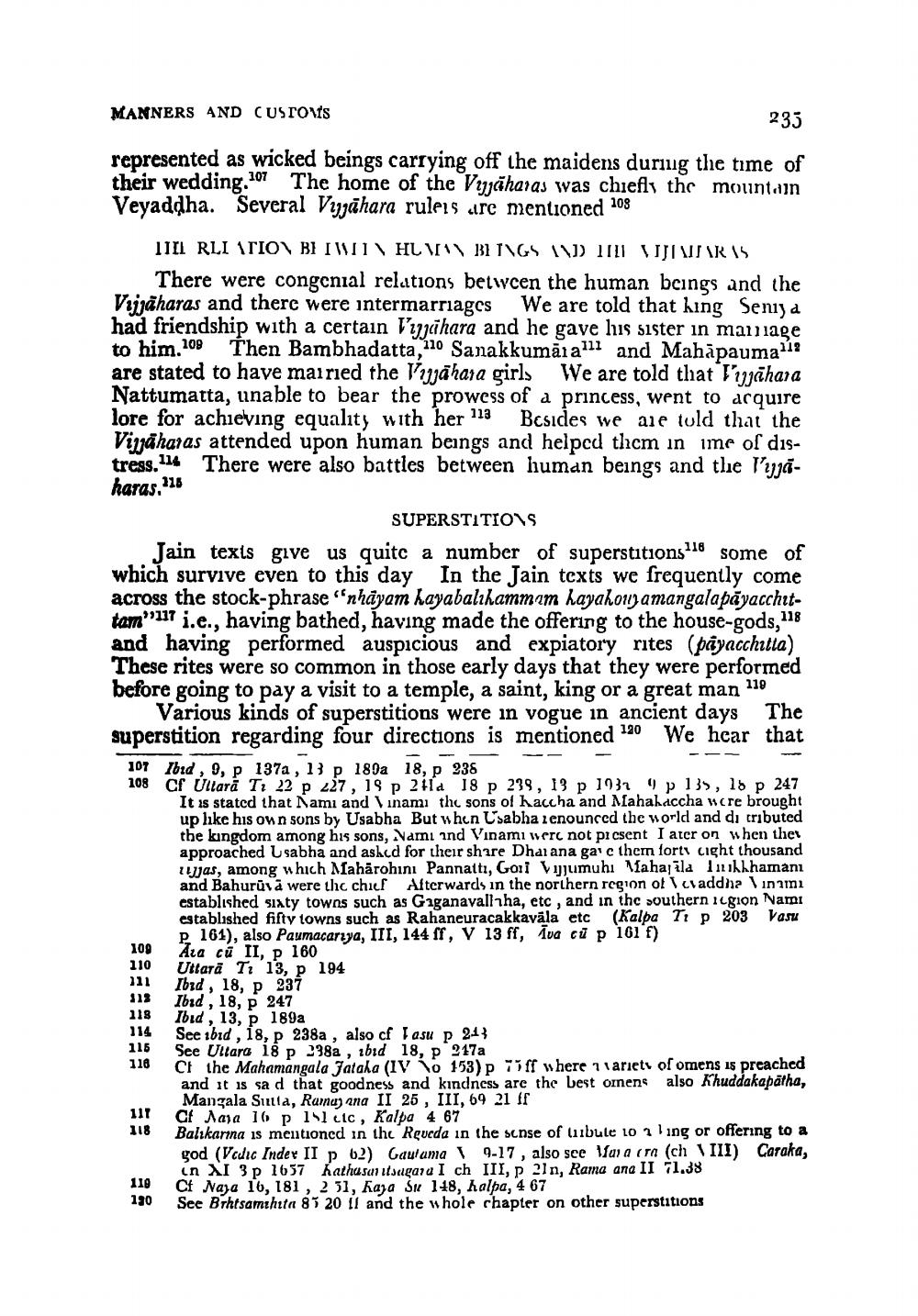________________
MANNERS AND CUSTOVI'
233
represented as wicked beings carrying off the maidens during the time of their wedding.107 The home of the Vijaharas was chiefly the mountain Veyaddha. Several Vigahara rulers are mentioned 108
TIIL RLI ITIO BI INTHL VIIBITGS IND) IN VIVIR 15
There were congenial relations betwcen the human beings and the Vijaharas and there were intermarriages We are told that king Seniya had friendship with a certain l'ugahara and he gave his sister in manage to him.109 Then Bambhadatta, 110 Sanakkumăralli and Mahāpaumalla are stated to have mairied the Vujā hara girls We are told that l'unjähara Nattumatta, unable to bear the prowess of a princess, went to acquire lore for achieving equality with her 113 Besides we are told that the Vināharas attended upon human beings and helped them in ime of distress.114 There were also battles between human beings and the l'1117
haras, 116
SUPERSTITIONS Jain texts give us quitc a number of superstitions 18 some of which survive even to this day In the Jain texts we frequently come across the stock-phrase "nhayam hayabalıhammam hayahou amangalapāyacchittem"117 i.e., having bathed, having made the offering to the house-gods, 118 and having performed auspicious and expiatory rites (payacchetta)
These rites were so common in those early days that they were performed before going to pay a visit to a temple, a saint, king or a great man 118
Various kinds of superstitions were in vogue in ancient days The superstition regarding four directions is mentioned 10 We hcar that
107 Ibid, 9, p 137a, 17 p 1899 18, p 238 108 Cr Ullara Tz 12 p 227, 19 p 211a 18 p 239, 13 p 1931 9 p 135, 16 p 247
It is stated that Nami and Vinami the sons of haccha and Mahahaccha ucre brought up hike his own sons by Usabha But when Isabha zenounced the world and di tributed the kingdom among his sons, Narnı and Vinami were not picsent I atcr on when the approached Usabha and asked for their share Dhaiana gaic them forti cight thousand
jas, among which Alahärohını Pannattı, Gori Vijumuhi Nahajala luhamanı and Bahurūv å were the chief Afterwards in the northern region of Icvaddha Vinami established sixty towns such as Gaganavallıha, etc, and in the southern Ilgion Nami established fifty towns such as Rahaneuracakkavāla etc (Kalpa T1 p 203 Vasu
P 161), also Paumacariya, III, 144 ff, V 13 ff, Iva cu p 161 f) 109 Ara cú II, p 160 110 Uttară T1 13, p 194 111
Ibid, 18, P 237 112 Ibid18, P 247 118 Ibid, 13, P 189a
See ibid, 18, p 238a , also cf lasu p 213 116 See Ulara 18 p 338a, bid 18, p 217a 118
CH the Mahamangala Jataka (IV \o 153) p 77 ff where 71 ariety of omens is preached and it is sad that goodness and kindness are the best ornens also Khuddakapātha, Mangala Sulla, Ramu, ana II 25, III, 69 21 If
Cf Maja 16 11 ctc, Kalpa 4 67 118
Balıkarına is mentioned in the Rgueda in the sense of turbule 10 aling or offering to a god (Vcdic Inder II p 62) Gaul ama 9-17, also see Vai a crn (ch VIII) Caraka, in XI 3p 1657 Kathusanitsugara I ch III, p 21n, Rama ana II 71.38
Cf Naya 16, 181, 2 51, Kaja Su 148, halpa, 4 67 190
See Brhtsamthita 85 20 Il and the whole chapter on other superstitions
114
111




